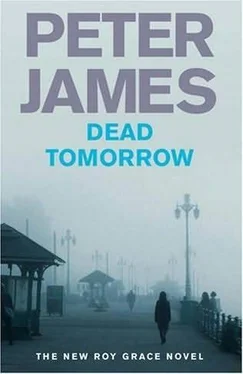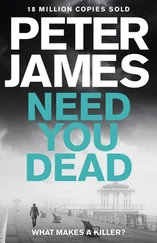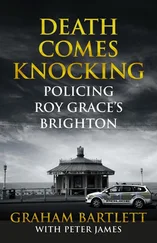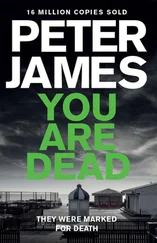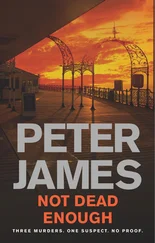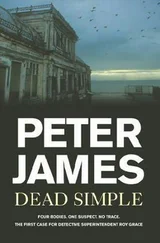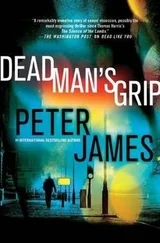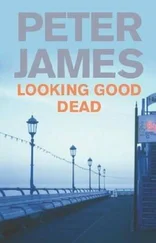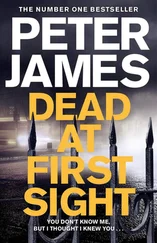‘You will understand our client confidentiality.’
‘Naturally.’
‘I will check our records and, if there is someone in your area, I will contact them and see if they would be willing to talk to you.’
‘Thank you. Can you tell me which clinic you would use?’
She looked evasive. ‘I’m sorry, but that will depend on theatre availability. We won’t make a decision until closer to the time.’
‘A private facility or a National Health one?’
‘I don’t think your National Health would be very cooperative, Mr Taylor.’
‘Because this is illegal?’
‘If you want to call saving your nephew’s life illegal, then yes. Correct.’ She looked at her watch. ‘I have a plane to catch, so I am sorry – because you arrived late, we have to make this meeting short. Perhaps you want to think about what I have said? Take our literature home with you? We never do a hard sell here. Why? Because, simply this. Always there are desperate people – and always there are organs. It is nice to meet you, Mr Taylor. You have my email and my phone number. I am available 24/7.’
*
Marlene Hartmann’s limousine was waiting outside and she was anxious to get off to the airport – her schedule was tight. But she sat at her desk until she saw, on the CCTV camera, that Roy Grace had left the building, then she downloaded two of his photographs from the camera to her mobile phone and texted them to Vlad Cosmescu in Brighton, asking him if he could identify this man, urgently.
Mr Roger Taylor , you are a liar, she thought to herself.
After ten years as an international organ broker she knew her market pretty well. She knew the way the system worked in the UK. If you were a patient suffering from acute liver failure, you would instantly be put on the liver transplant list and you would be hospitalized. You would not be well enough to be at home.
Roger Taylor, if that was his real name – and she thought not – had fallen at the first hurdle. Who was he? And why had he come to see her? She suspected from the man’s demeanour and the kinds of questions he was asking, that she already knew the answer.
Then, as she stood up to leave, her phone rang and her day suddenly got worse.
With the calm weather and the wide, empty expanse of the English Channel all around them, diving conditions – regardless of the near-freezing water temperature – were about as good as it got. Compared to a weed-infested lake or a murky canal booby-trapped with discarded shopping trolleys, barbed wire and chunks of jagged metal, today was, in the slang of the Specialist Search Unit, a Gucci dive.
But on the two monitors relaying video images from the diver’s camera, there was just a grey blur.
Jon Lelliott – better known as WAFI – assisted by Chris Dicks, nicknamed Clyde, had positively identified the wreck as being the Scoob-Eee. And he had found a body in the prow cabin that he was bringing to the surface now.
The rest of the team, accompanied by Glenn Branson, who was feeling a little wobbly but a lot better than on his last sea voyage, peered over the deck rail at the increasing mass of bubbles breaking the surface around the yellow, blue and red coils of the air and voice supply line, and the four ropes on which the buoyancy bag had been lowered. Moments later the masked head of WAFI appeared, accompanied seconds later by a body breaking the surface in a maelstrom of bubbles.
‘Oh shit!’ Gonzo exclaimed.
Branson turned away after one quick look, now struggling to hold down his breakfast.
WAFI pushed the body, which, supported by the air bags, was floating high in the water, towards the side of the boat.
Then several members of the team, clumsily aided by Glenn Branson, hauled on the ropes, pulling the heavy, waterlogged body up the side of the Sunseeker, over the deck rail.
The marine architect who had designed this craft had in his mind, most likely, that the rear sundeck would be adorned by wealthy playboys and beautiful, topless floozies. He probably never envisaged the sight that now greeted the SSU team and the hapless Detective Sergeant.
‘Poor sod,’ Arf said.
‘Definitely Jim Towers?’ Tania Whitlock asked him.
Although in charge of the Specialist Search Unit, the sergeant had been with the team for less than a year and did not know all the local harbour faces as well as some of her team.
He nodded grimly.
‘Definitely,’ Gonzo confirmed. ‘I’ve been working with him for about five years. That’s Jim.’
The man’s body was bound, up to his neck, with grey duct tape. His head poked above it, with just a single strip across his mouth. A small crab skittered across the tape, and Arf ducked down, grabbed it and threw it back overboard.
‘Fuckers,’ he said. ‘I hate them.’
Glenn could see why.
The heavily bearded lower part of the dead man’s face was intact. But some of the flesh from his cheeks and forehead, and the muscle and sinews beneath, were gone, leaving patches of bare skull. One eye socket had been picked clean. The other contained the remnants of the white of an eye, reduced to the size of a raisin.
‘Don’t think I’ll be ordering the crab and avocado starter for a while,’ quipped Glenn, trying to put on a brave face.
‘Anyone here fancy being buried at sea?’ Juice enquired.
There were no takers.
Vlad Cosmescu was a worried man. He sat at his desk with his computer in front of him, no longer enjoying the view out across the Brighton seafront. Every half-hour or so he checked the latest online news on the local paper, the Argus .
He had been smarting ever since that phone call last week.
You’ve screwed up.
For years this city had been a great gig for him. Awash with money and girls. Providing him with the cash to keep his handicapped sister in a nice home. And the income to keep him in a lifestyle he could once only have dreamed of.
He did not like to be told he had screwed up.
He had always been obsessively careful. Gaining the trust of his employees. Steadily building up his business empire here. The massage parlours. Escort agencies. The lucrative drug deals. And, more recently, the German connection. The organ trade was the best business of all. Every successful transplant put tens of thousands of pounds in his pocket. And from there, straight into his Swiss bank account.
If he had learned one thing about his adopted country, it was that the police were focused on the trafficking of drugs. Everything else took a back seat. Which was OK by him.
Everything had worked just fine. Until Jim Towers.
Maybe the boatman had made a genuine mistake in putting those bodies in a dredge area. But he did not think so. Towers had tried to screw him – whatever his motive. Morality? Blackmail?
Suddenly his phone pinged with an incoming text.
It was from his biggest source of money, Marlene Hartmann, in Munich.
Like himself, to make it harder for the police to monitor her, she acquired a new pay-as-you-go mobile phone each week.
The text said: Do you know this man?
Two photographs were attached. He opened them. Moments later, he was reaching for a cigarette.
When he had first set up shop here, he had made it his business to learn the face of every police officer who might be interested in him. He had followed the career path of this particular detective, thanks to the Argus newspaper, for several years, watching his rise up the ranks.
He dialled her number. ‘Detective Superintendent Roy Grace from Sussex CID,’ he informed her.
‘He has just been in my office.’
‘Maybe he needs an organ?’
Читать дальше
